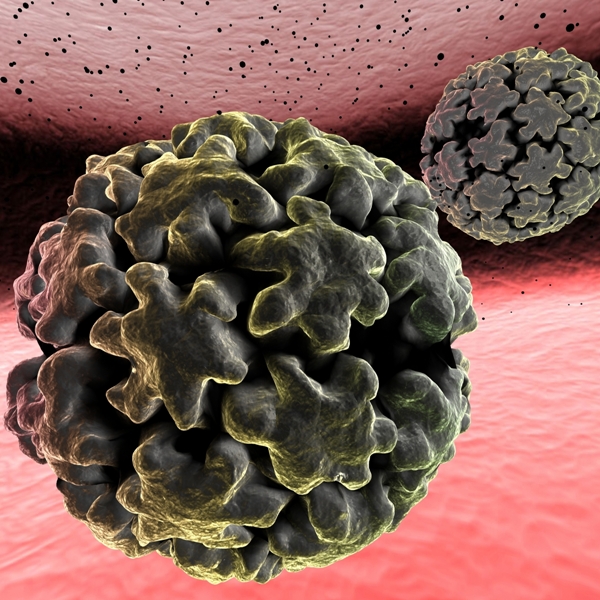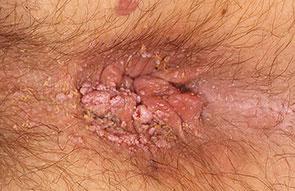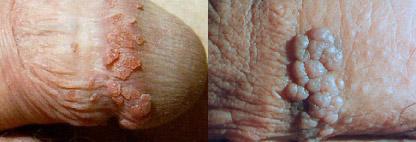Genital Warts (HPV)

Human Papilloma Virus (HPV) is one of the most common sexually transmitted diseases in the world. Genital warts are the most easily recognized sign of genital HPV infection. About two-thirds of people who have sexual contact with a partner with HPV will become infected and develop warts. Genital warts are soft, moist, usually flesh colored, and appear in the genital area within weeks or months after infection. The warts may be flat, small or large. They sometimes appear in clusters that resemble cauliflower-like bumps. In men, genital warts usually are seen on the tip of the penis. They also may be found on the shaft of the penis, on the scrotum, or around the anus. There are cases where genital warts have been found on the thigh and groin.
How is it spread?
HPV is very contagious and easily spread during sex with an infected partner. It is transmitted by skin-to-skin contact during anal, vaginal and less frequently oral sex with someone who is infected. HPV is not transmitted through casual contact such as hugging, shaking hands, sharing food, using the same eating utensils, drinking from the same glass, sitting on public toilets, or touching door knobs.
What are the symptoms?
Small bumpy warts on the sex organs or anus (see picture)
Itching or burning around the sex organs
Although warts may go away, either on their own or because of treatment, the virus has not necessarily left the body. The warts may come back and the person is still infectious
Like many STDs, HPV infections often do not have signs and symptoms that can be seen or felt. If you are infected but have no symptoms, you can still spread HPV to your sexual partner(s) and/or develop complications from the virus


How is it treated?
Treatment of genital warts removes the warts and does not cure the viral infection. A healthcare provider may choose one of several methods to treat genital warts. Warts on the genitals may be frozen with liquid nitrogen (cryotherapy).
Liquid nitrogen treatment – The healthcare provider applies the liquid nitrogen over the course of multiple office visits until the warts are completely gone.
Podophyllin – Warts on the genitals may be treated weekly with Podophyllin by your healthcare provider. You may also be prescribed a medicine called Podofilox (brand name: Condylox), which is applied to the warts at home twice a day for three days, and then rest for four days. This “do at home” process is repeated weekly until the warts are gone.
Loop electrosurgical excision procedure (LEEP) – With this method for removing genital warts, the healthcare provider passes a sharp instrument shaped like a loop underneath the wart, cutting the wart out of the skin.
CO 2 laser surgery – For large warts in the genital area, laser surgery may be needed for complete removal.
Iterferon injections – For genital warts that don’t go away after they’ve been treated with other methods, your healthcare provider may try an interferon injection into the warts. Interferon is a chemical produced in our bodies, to help our immune systems fight infection. An injection of interferon into the wart may help your body’s immune system fight the virus that is causing the wart. Generally, interferon is injected into warts twice a week for up to eight weeks, or until the warts are gone.
Warts on the skin (such as on the fingers, feet and knees) and warts on the genitals are removed in different ways. Don’t try any home remedies or over-the-counter drugs to remove warts on the genital area. You could damage your genital area by putting certain chemicals on it.
How can infection be prevented?
HPV vaccines that protect us from the HPV strains known to cause genital warts and cancers are available. For more vaccine information, click here. Abstinence is the only 100% effective way of preventing genital warts. HPV is passed on by skin-to-skin contact with an infected person. However, if you chose to engage in sexual activities and are unsure if you or your partner is possibly infected, consistent and correct use of latex barriers (condoms) can help reduce the risk of transmission. Warts may not always appear in the place where skin contact occurred and only areas covered by condoms, dams or gloves are protected from infection. Washing your hands right after sex can also help prevent transmission.
If you think that you or someone you know may have been infected with HPV click here for testing sites. If you’re sexually active, sign-up for free STD testing reminders via email, text or both at WeAllTest.com. If We All Test, we can help eliminate syphilis and other STDs in our community.